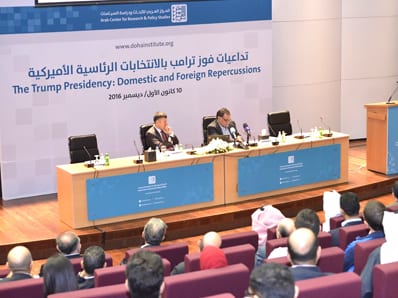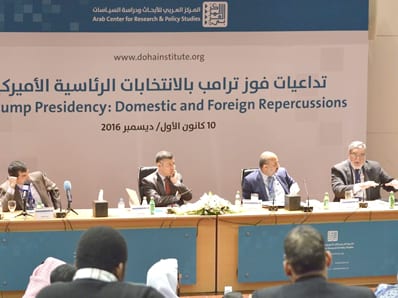The Arab Center for Research and Policy Studies (ACRPS) held on December 10, 2016, a one-day academic symposium entitled, The Trump Presidency: Domestic and Foreign Repercussions with the participation of thirteen scholars and researchers affiliated with ACRPS, its Washington DC affiliate, the Arab Center Washington DC (ACW), and the Doha Institute for Graduate Studies.
 In addition to a plenary lecture by Dr. Azmi Bishara on the historical context of the Trump victory, the program included three complementary panels focusing on the incoming Trump administration. The first panel dealt with the emerging doctrine, philosophy, and foreign policy vision of the president-elect. The second panel focused on the internal historical and socio-economic factors that contributed to his electoral victory. The third panel dealt with US foreign policy under Trump by focusing on three case studies namely, Iran, Palestine, and Egypt.
In addition to a plenary lecture by Dr. Azmi Bishara on the historical context of the Trump victory, the program included three complementary panels focusing on the incoming Trump administration. The first panel dealt with the emerging doctrine, philosophy, and foreign policy vision of the president-elect. The second panel focused on the internal historical and socio-economic factors that contributed to his electoral victory. The third panel dealt with US foreign policy under Trump by focusing on three case studies namely, Iran, Palestine, and Egypt.
The event, held at the new campus of the Doha Institute, began with a lecture by Azmi Bishara, ACRPS general director, who spoke on the rapidly crystallizing cultural divides within traditionally democratic societies like the United States and the rise of populist rightwing movements in these countries. Bishara anticipated that Trump’s problem will essentially be an internal one focusing on the domestic struggle over the cultural, political, and economic identity of American society rather than on important foreign policy issues including the Middle East or the Pacific region. He attributed Trump’s victory to the resurgence of the right and the importation of the clash of civilizations to the domestic scene where democracy is giving birth to the contradictions of liberalism.
In his presentation on Trump’s Middle East challenges, Khalil E. Jahshan described the intense worldwide speculation regarding the foreign policies to be pursued by the new administration. The ACW executive director detailed the anxiety and confusion throughout the Middle East generated by the lack of clarity, cohesion, and depth characterizing the statements by the president-elect and his advisers regarding the region. He also concurred with Dr. Bishara, that Trump’s initial challenge will be domestic, even though the turbulent region will not necessarily leave the new administration alone.
Dr. Marwan Kabalan, who directs the Research Unit at ACRPS, characterized the Trump presidency as potentially Jacksonian in terms of its nationalistic, populist, and isolationist tendencies. Trump, according to Kabalan, will withdraw from various international agreements and could even undo the entire post-World War II international system based on the existence of NATO as a bulwark against Russia.
 On the other hand, Political Analyst Joe Macaron emphasized the impact of Trump’s personality traits on his policies, including his confrontational tendencies and his philosophy of winning at any price. Macaron also highlighted Trump’s dark or pessimistic view of the United States, which differs from the optimistic assessment of most other political candidates. This negative perception of America appealed to the many angry and dissatisfied voters throughout the United States.
On the other hand, Political Analyst Joe Macaron emphasized the impact of Trump’s personality traits on his policies, including his confrontational tendencies and his philosophy of winning at any price. Macaron also highlighted Trump’s dark or pessimistic view of the United States, which differs from the optimistic assessment of most other political candidates. This negative perception of America appealed to the many angry and dissatisfied voters throughout the United States.
Of interest to the audience at the symposium was how this would play out in terms of the Palestinian situation and American sponsorship of a Middle East peace agreement and a two-state solution. Ibrahim Fraihat, formerly of the Brookings Institution and now at DI, detailed several of the concerns that many pro-Palestinian individuals have with the rise of Trump—including, for example, the unorthodox idea of the president-elect’s son-in-law Jared Kushner as a special envoy to the Middle East, given the Kushner family’s strong connections to Israel. At the same time, Fraihat reassured the audience that this uniquely untested president-elect of the United States could only do a limited amount of damage to the Palestinian cause. He explained that “US foreign policy is defined by an establishment and the interests defined by that establishment: institutions, lobbies, and large companies. The power of the presidency will be restricted, largely, to arranging those interests by order of priority.”
Interestingly, symposium participants viewed Trump’s electoral victory not in the framework of international conflict but rather as one that pitted different strata of American society against each other. Doha Institute faculty Samer Shehata and Mark Farha debated that the bitterness fueling the defeat of former secretary of state Hillary Clinton by Donald Trump, a real estate developer, was based on a surging class resentment resulting from the collapse of most Americans’ real income over the past five decades. Unemployment, in addition, now affects one in four in the labor force. These comments and analyses clearly echoed the point made by Bishara at the beginning of the symposium that “The [real] challenge to the rule of Trump will come not from international affairs but from his own domestic audience.”
